Summer 2023 Course Announcements
Go to the Summer 2023 Course Schedule page to see the schedule for all Summer 2023 courses.
Note: Continuing Education (CE) Classes are Billed Separately. If you enroll in both Main Campus and CE classes in the same term, CE tuition will be billed in addition to your Main Campus tuition. CE courses are not COF eligible.

GEOG 1001
Environmental Systems: Climate and Vegetation
Section 200: Sarah Posner, Summer Session B, Online, July 11 – August 11
Section 581*: Steve Welter, Summer Session 1, Online, June 5 - July 7
The objective of this course is to provide you with an introduction to the Earth's climate system and patterns of world vegetation. We will emphasize the many linkages and feedbacks between the non-living (abiotic) and living (biotic) components of the earth system.
Topics we will cover include radiation, temperature, winds and pressure, the water cycle, climate change, and biomes. This course will prepare you for subsequent, more specialized courses in climatology, hydrology, ecology, and biogeography (ecosystems and cycles). This is a natural science course, and graphs and basic algebra-level math calculations will be used to help understand the concepts covered.
*Continuing Education (CE) Classes are Billed Separately. If you enroll in both Main Campus and CE classes in the same term, CE tuition will be billed in addition to your Main Campus tuition. This class is not COF eligible.
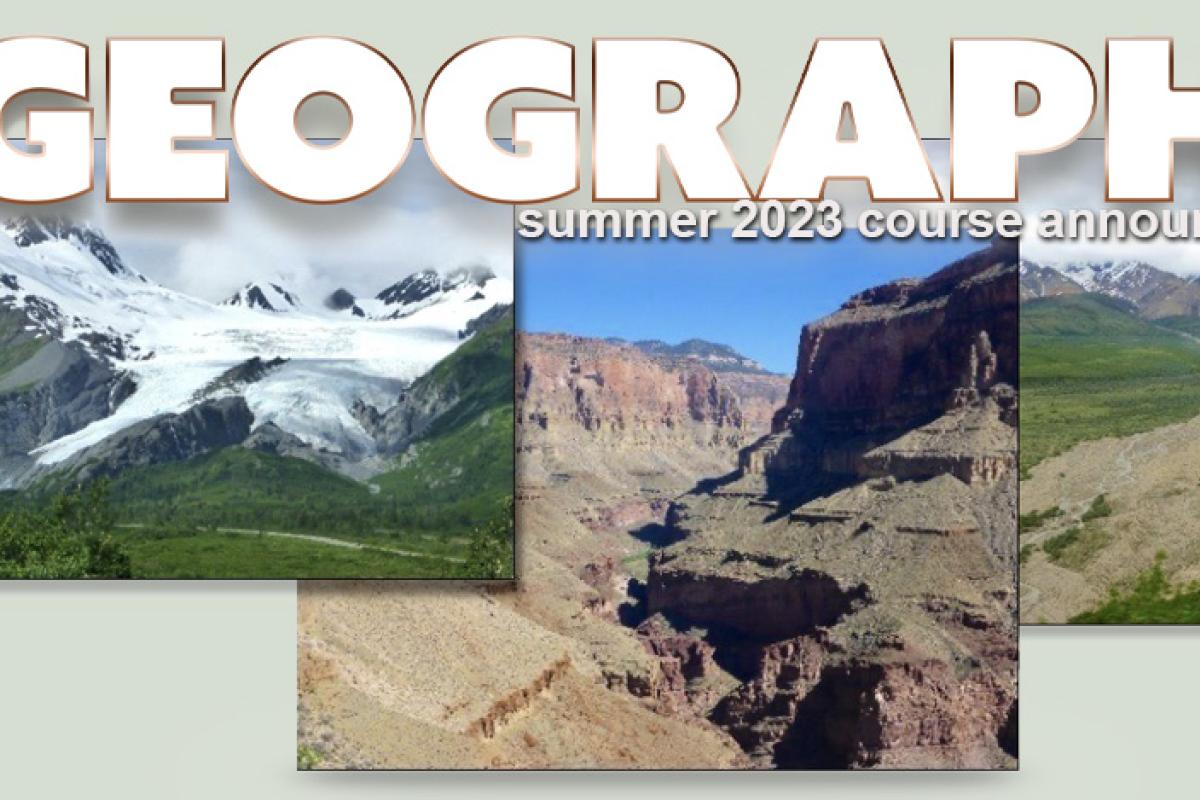
GEOG 1011
Environmental Systems: Landscapes and Water
Section 581: Steve Welter, Summer Session 1, Online, June 5 - July 7
Section 582*: Margaret White, Summer Session 2, Online, July 10 - August 11
Earth’s landscapes – the natural surfaces composed of rock, soils, water and vegetation – are always changing. These landscapes host life and human activity. Knowledge of how the Earth’s surface changes is necessary to ensure public safety, provide food and water security, and support ecosystem management – and thus this knowledge is relevant to diverse career pursuits.
Topics covered include the basic geologic processes of plate tectonics, volcanoes, and earthquake. We then explore how the land surface is shaped by water and physical processes, focusing on weathering, soils, hydrology, fluvial processes, glaciers, climate change, and human impacts. By the end of the course, you will be familiar with the primary physical processes involved in the formation of the Earth’s landscapes. You should also be able to generally describe how these natural sciences are related to important scientific and societal issues.
*Continuing Education (CE) Classes are Billed Separately. If you enroll in both Main Campus and CE classes in the same term, CE tuition will be billed in addition to your Main Campus tuition. This class is not COF eligible.
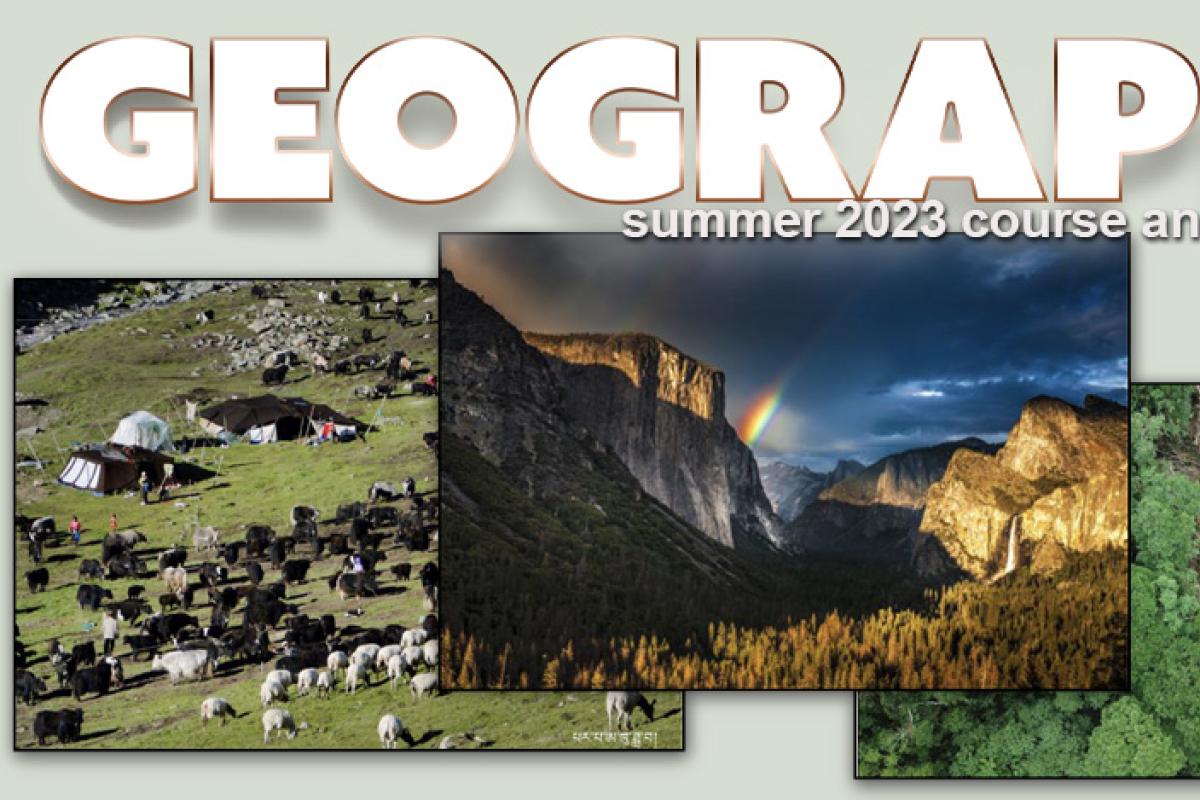
GEOG 1972
Environment-Society Geography
Section 001: Naomi Hazarika, Maymester, Remote, May 15 – June 2
Section 581*: Emma Loizeaux, Summer Session 1, Online, June 5 – July 7
The study of global environmental issues evokes one of the most profound questions of our times: What is, and what ought to be, the relationship between humans and the environment? To answer this, we must also ask: What is “nature” and how do people of different cultures conceptualize it differently? What drives human modification of the earth and its non-human inhabitants, and how are specific groups of people differentially affected by these modifications? What kinds of assumptions have led to the creation of certain environmental problems, and for whom or what are they problems? Topics we will cover include anthropogenic climate change; population and consumption; hazards, ethics, and environmental justice; conservation; wolves; trees/deforestation; food/agriculture, water, and waste. We will draw from examples around the world to critically examine how environmental problems are defined and tackled and what this tells us about nature-society relations more broadly.
This class fulfills a MAPS requirement and a requirement for the Geography Major; it is also a great introduction to “Environment-Society” Geography Track.
*Continuing Education (CE) Classes are Billed Separately. If you enroll in both Main Campus and CE classes in the same term, CE tuition will be billed in addition to your Main Campus tuition. This class is not COF eligible..
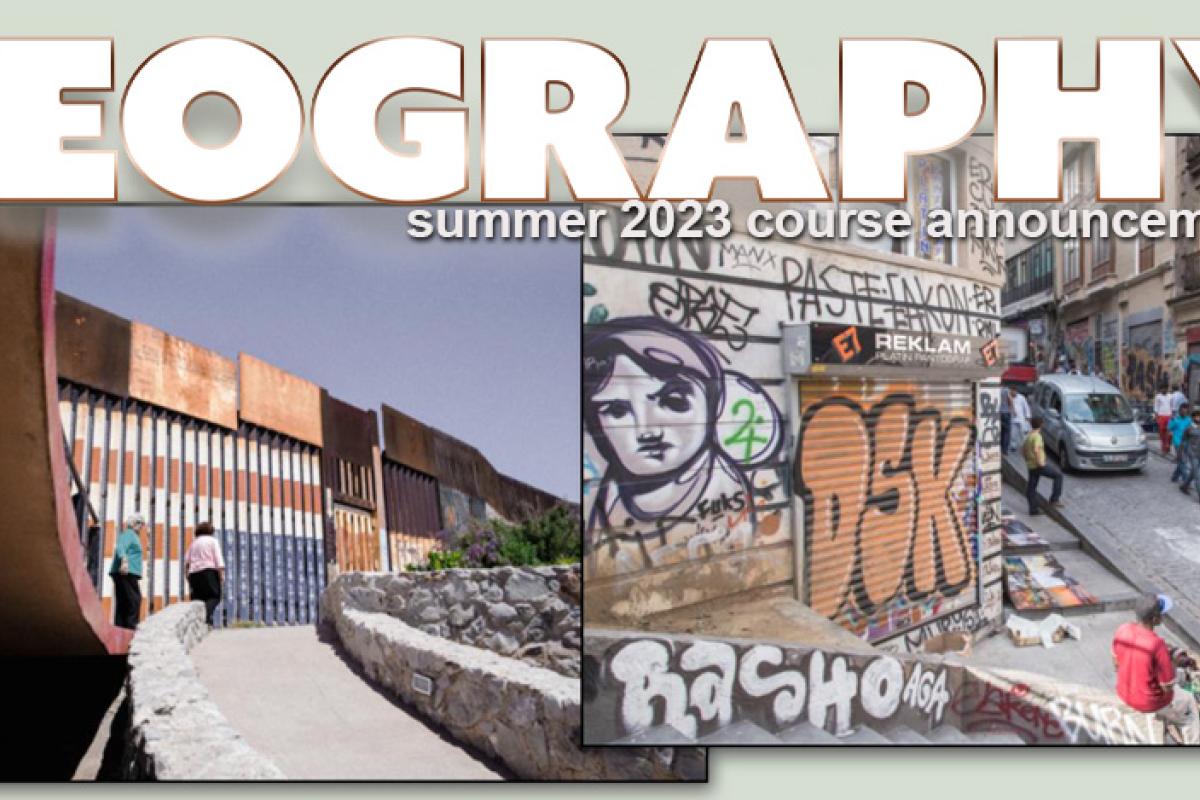
GEOG 1992
Human Geographies
Section 581*: Caitlin Ryan, Summer Session 5, Online, June 5 - August 28
Examines social, political, economic, and cultural processes creating the geographical worlds in which we live, and how these spatial relationships shape our everyday lives. Studies critical geopolitics, ecological change, international development, population dynamics, urbanization, and migration to explore how these processes work at global scales as well as shape geographies of particular places.
This class fulfills a MAPS requirement and a requirement for the Geography Major; it is also a great introduction to the "Human Geography" Track.
*Continuing Education (CE) Classes are Billed Separately. If you enroll in both Main Campus and CE classes in the same term, CE tuition will be billed in addition to your Main Campus tuition. This class is not COF eligible..
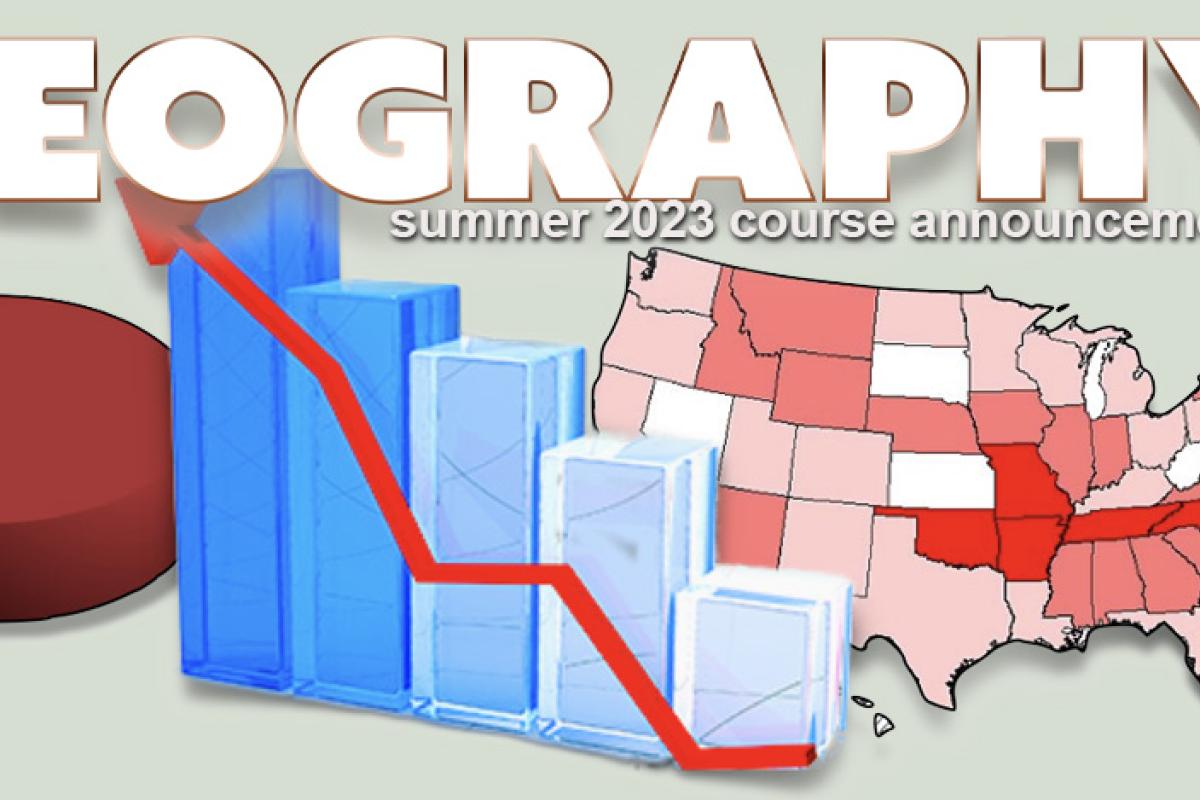
GEOG 3023
Statistics and Geographic Data
Section 581*: Teresa Chapman, Summer Session 3, Online, June 5 – August 11
From fitness trackers to Facebook to polls on politics and other issues, our world is flooded with data. Careers in Data Science are in high demand, and technological and societal changes make data available on nearly everything.
In this course, we teach you how to understand and model the relationships between data and your world. You'll learn how to collect data, learn modeling techniques, and develop questions that we can answer with statistical methods. The course is hands-on and will guide you in using the latest statistical software to produce graphics, answer questions, and find patterns about the world around us.
This course does not assume any previous experience with statistics. It satisfies the statistics requirement for the Geography major, and serves as a great introduction to data modeling for any Geography major or minor.
*Continuing Education (CE) Classes are Billed Separately. If you enroll in both Main Campus and CE classes in the same term, CE tuition will be billed in addition to your Main Campus tuition. This class is not COF eligible..
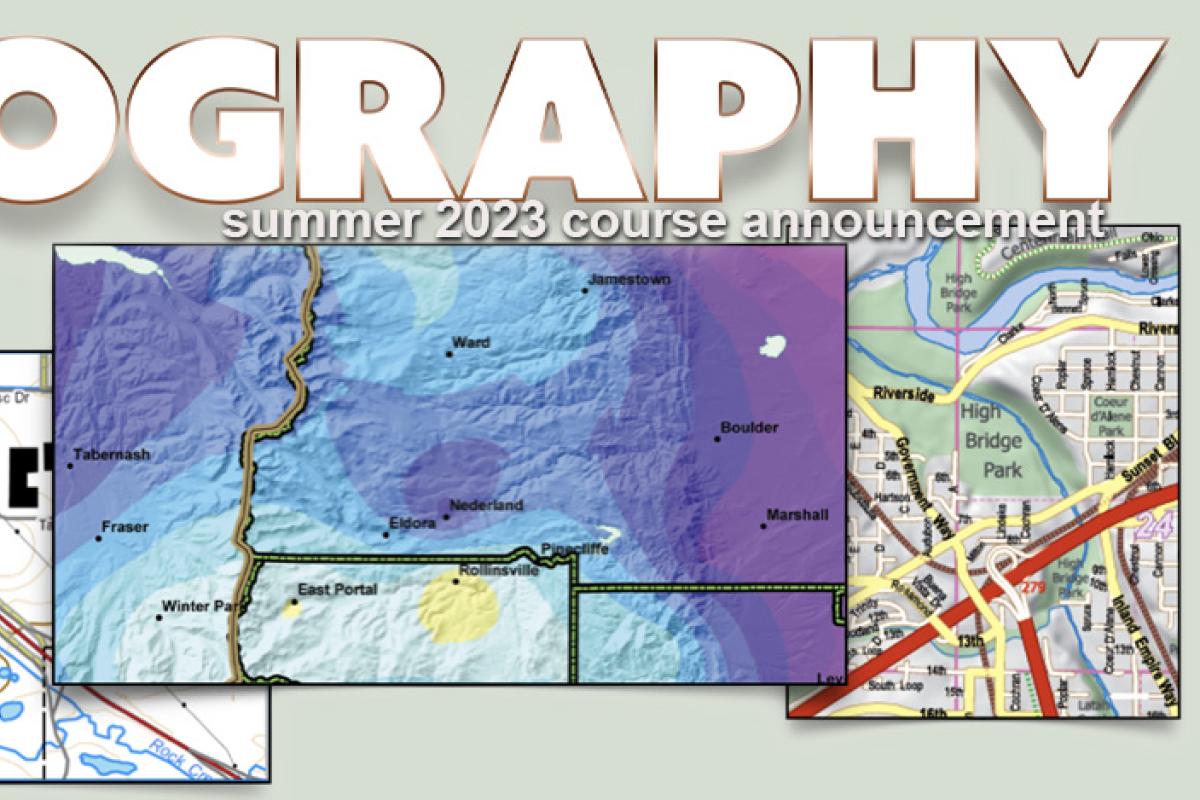
GEOG 3053
Geographic Information Science: Mapping
Section 100: Sarah Kelly, Summer A Session, Online, June 5 - July 7
Section 581: Teresa Chapman, Summer Session 3, Online, June 5 - August 11
Mapping and data visualization supports many tasks in Geography, Environmental Studies, Earth Sciences and Human and Social Sciences. Maps can help you explore spatial data, perform analysis, and present meaningful results. Knowing how to put together a database and process layers of terrain, water, roads, and thematic data (vegetation, population, etc.) in order to make a map is an extremely useful skill that many employers are seeking. Come learn what it is all about!
This course provides a technical introduction to mapping and information design in a GIS environment. We'll cover principles of scientific visualization, graphical design, and mapping. You'll learn how to manipulate scale, work with and change map projections, how to select informative colors, how to classify map data, and how to symbolize data, and how to quantify patterns of error on maps. In lab, you will design maps and create a working cartographic database. By the end of this course, you will be capable of creating high quality cartographic displays and work comfortably with Desktop ArcGIS software to process spatial data.
Some prior experience with Apple or Windows computing is expected. No previous experience in ArcGIS or mapping technologies is required. GEOG 3053 is a prerequisite for the Geography GIS courses. A beginning course in statistics is strongly recommended and may be taken concurrently
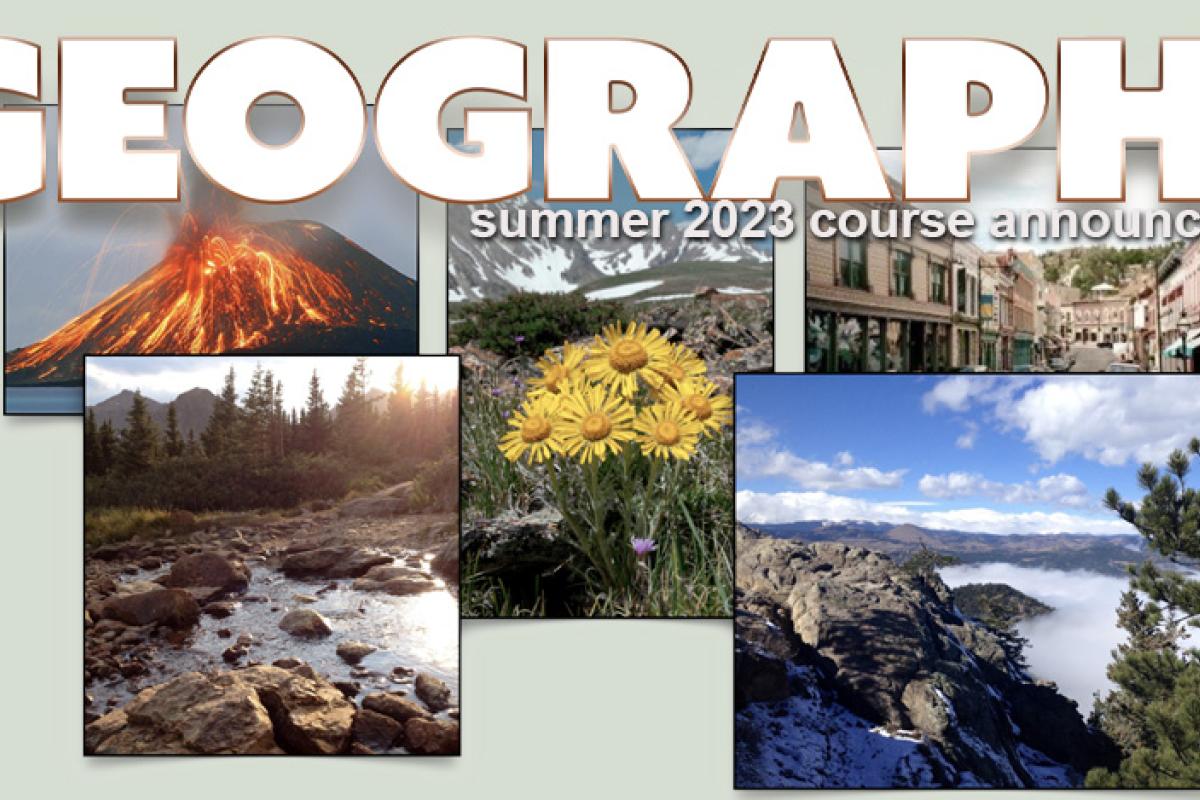
GEOG 3251
Mountain Geography
Section 001: Peter Blanken, Maymester, Online, May 15 - June 2
Section 581*: Kirk Stueve, Summer Session 2, Online, July 10 - August 11
The world’s mountains are fascinating and mysterious landscapes. Created by geologic activity, shaped by water and ice, and transformed by vegetation and human activity, mountain landscapes offer a unique perspective into historical and current events. Using mountain landscapes as our study area, this course will examine the interactions and connections among key topics in physical and human geography. Daily presentations and frequent hands-on activities will apply geographic concepts to the Colorado Rockies as well as mountain ranges around the world. To explore our mountain landscapes, local examples will be used to examine how wildfire impacts local forests and human communities, and investigate how historic mining and continuing human activities have shaped the mountain landscapes in our backyard.
*Continuing Education (CE) Classes are Billed Separately. If you enroll in both Main Campus and CE classes in the same term, CE tuition will be billed in addition to your Main Campus tuition. This class is not COF eligible..
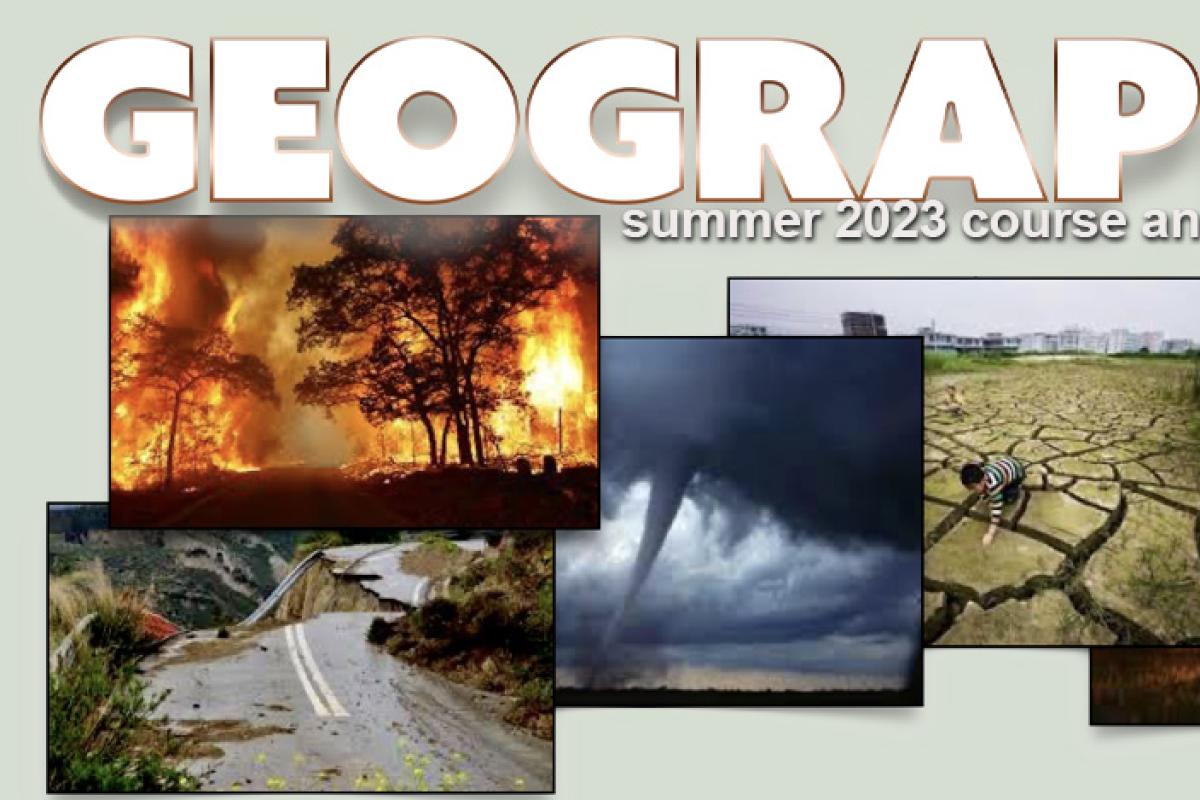
GEOG 3402
Natural Hazards
Section 100: Luca Palasti, Summer Session A, Remote, June 5 - July 7
Sections 581*: Kirk Stueve, Summer Session 2, Online, July 10 - August 11
This class examines the interaction of society and natural extremes, with particular attention to exposure, vulnerability, preparedness, mitigation, and recovery from natural disasters. Our social science approach differentiates this class from courses on natural disasters taught as natural science, where the emphasis is on the physical processes (like tectonics and volcanism). We treat the subject as both an academic field of inquiry that provides insight into social structures, human behavior, and environment and society relationships, and as a professional field in which students learn methods and skills that can be applied to careers in environmental and hazards management. While we will briefly cover the physical science of hazards like hurricanes, floods, and earthquakes, the focus is on human geography: how people and institutions perceive and respond to hazards and how development in hazardous areas increases risk. Given the time, we will also briefly examine technological hazards and disasters.
This is a lecture class, with exercises and exams. The material is in four main categories: (1) concepts and principles, including material on the nature of extreme events, social exposure and vulnerability, trends in hazard impacts, and ways to measure and characterize hazards and risks; (2) specific hazards like hurricanes, floods and earthquakes; (3) hazard impact reduction, including mitigation, warning systems; land use; insurance; and recovery; and (4) special topics such as events in the news.
*Continuing Education (CE) Classes are Billed Separately. If you enroll in both Main Campus and CE classes in the same term, CE tuition will be billed in addition to your Main Campus tuition. This class is not COF eligible..
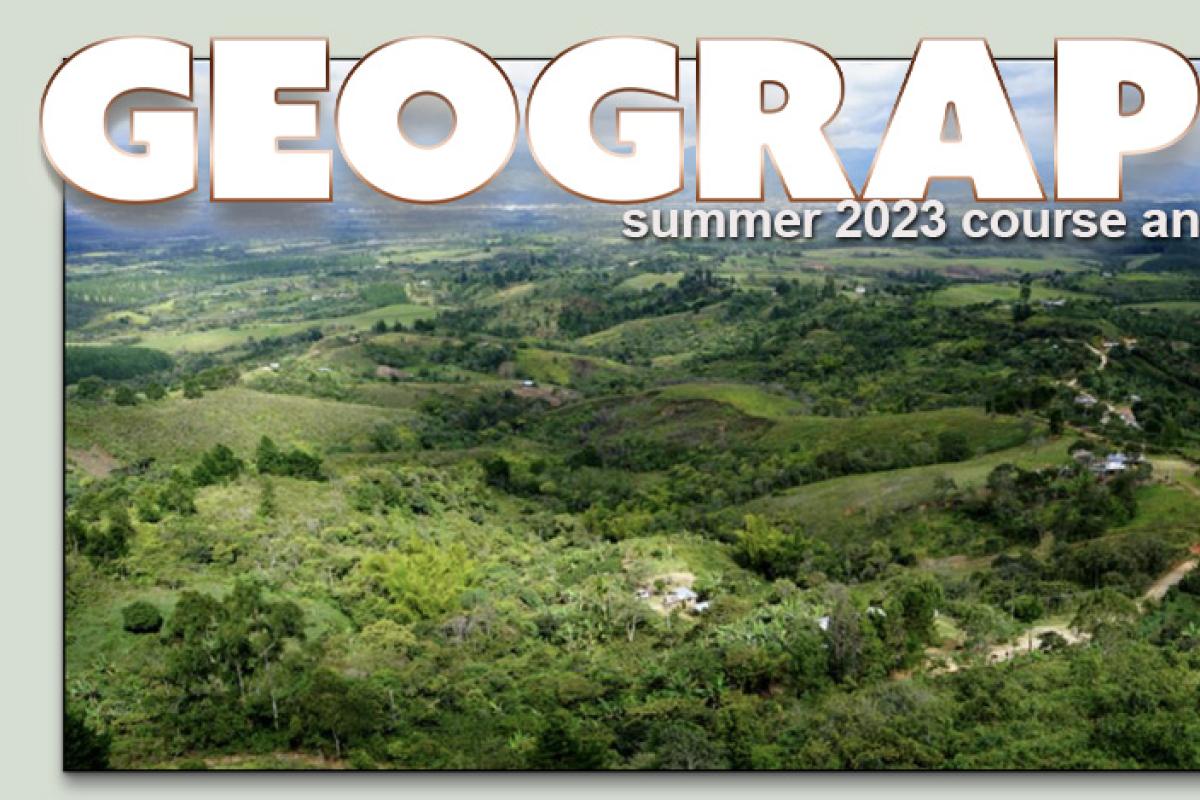
GEOG 3682
Geography of International Development
Section 581*: Caitlin Ryan, Summer Session 5, Online, June 5 - July 28
In the time of COVID-19, we are entering an unprecedented era of International Development. As the virus, social injustices, political upheavals, and economic crises rage on around the world, it is important for us to consider the role development has played in getting us to where we are today and what development will look like going forward. In this class, we will look at the origins and history of
development as an international capitalist project and also movements demanding a better, more inclusive development.
*Continuing Education (CE) Classes are Billed Separately. If you enroll in both Main Campus and CE classes in the same term, CE tuition will be billed in addition to your Main Campus tuition. This class is not COF eligible.
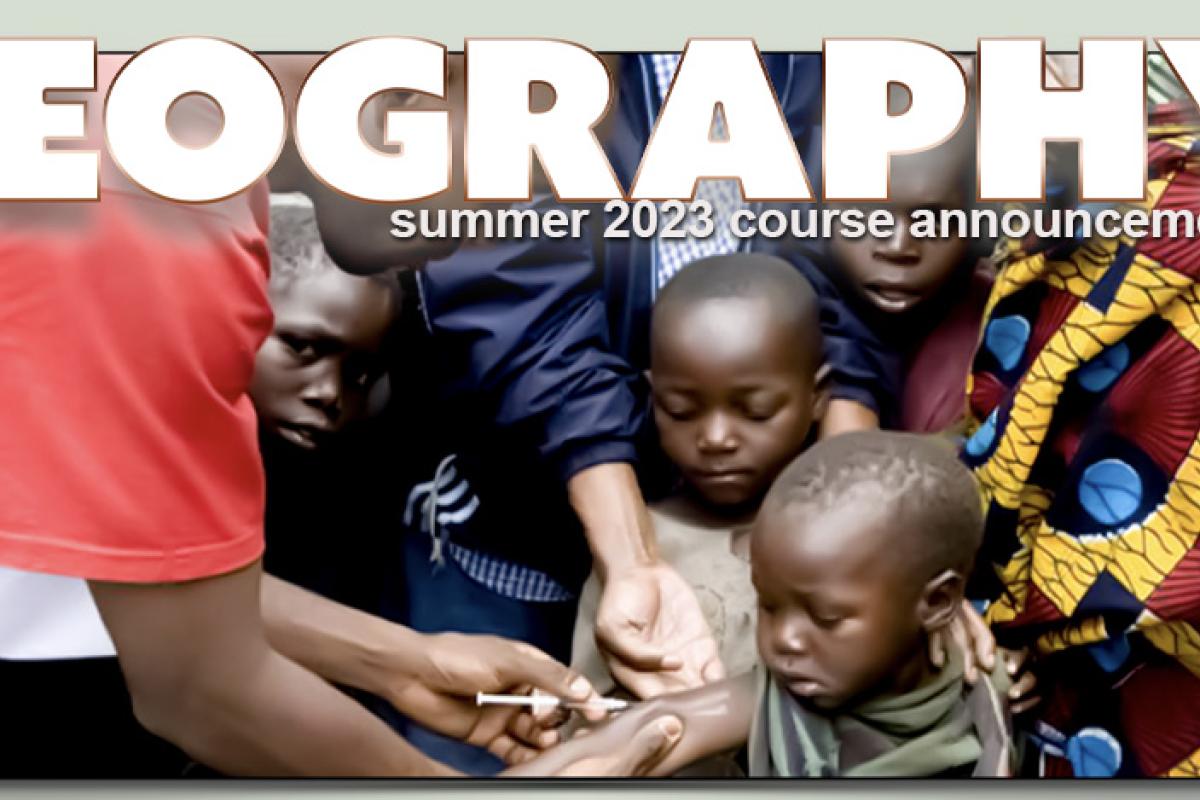
GEOG 3692
Introduction to Global Public Health
Section 100/101: Juan Ramirez, Summer Session A, Online/Remote, June 5 - July 7
Section 200/201: Xiaoling Chen, Summer Session B, In-Person, July 11 - August 28
Section 581*: Caitlin Ryan, Summer Session 5, Online, June 1 - July 2
This course explores critical issues in global public health through a biosocial lens, incorporating the biological, economic, political, social and cultural influences on health. We take a candid look at the challenges of quantifying health as well as the issues of past health and development initiatives (with a focus on developing countries). We examine the tensions between intellectual property rights and the fundamental need for affordable medicines as played out in the cases of TB and HIV. We delve into the roles of the World Health Organization, nongovernmental organizations and ministries of health in addressing both infectious and non‐communicable diseases. We explore health care systems and consider the essential elements of systems which improve accessibility and quality of care for its citizens. We look at the future priorities of global health, including the impact of climate change on health. By engaging in discussions, structured in class activities and written assignments, students will wrestle with the complexity of issues that make up the rich field of global public health.
*Continuing Education (CE) Classes are Billed Separately. If you enroll in both Main Campus and CE classes in the same term, CE tuition will be billed in addition to your Main Campus tuition. This class is not COF eligible.
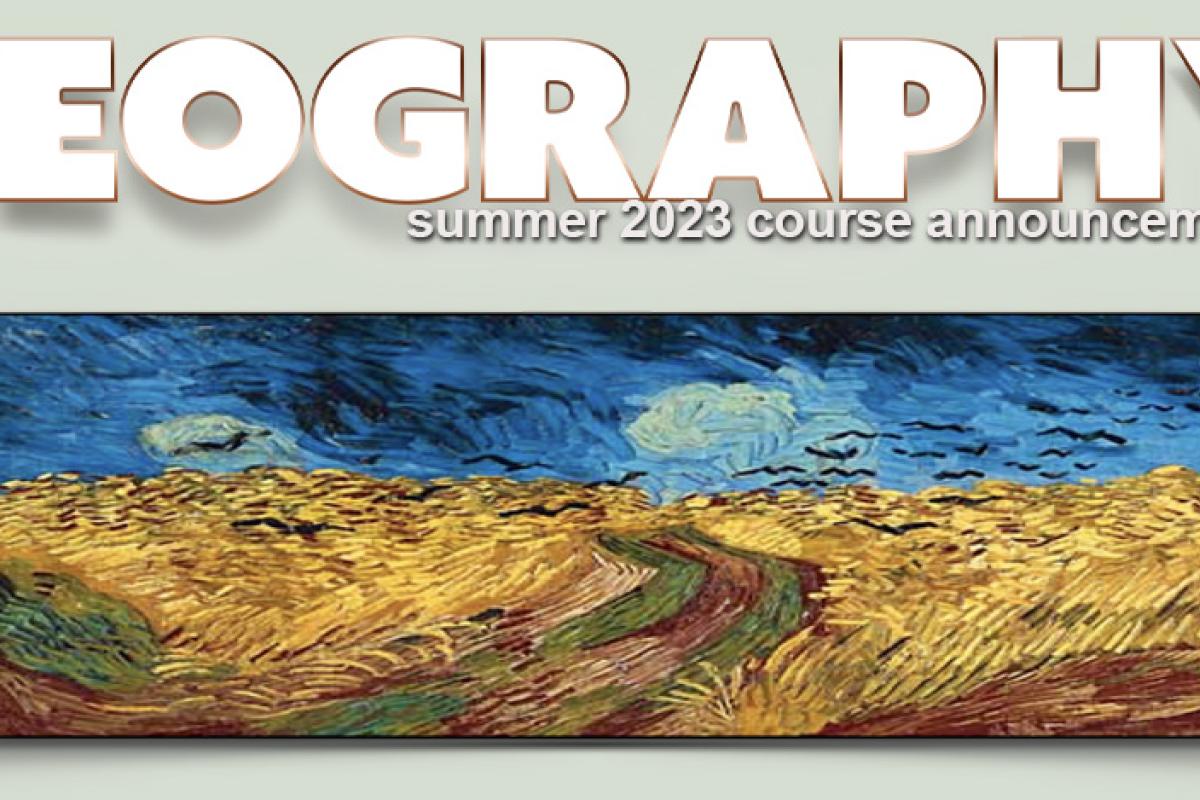
GEOG 3742
Place, Power and Contemporary Culture
Section 100: Aja Procita, Summer Session A, In-person, June 5 - July 7
Section 581*: Jessica DiCarlo, Summer Session 1, Online, June 5 - July 7
What is 'power,' and how are spaces produced through relationships of power? GEOG 3742 introduces students to key theories and contemporary debates in critical and feminist geography through a focus on the themes of power, space, and culture as conceptual frameworks. We will apply critical geographic perspectives on power to the topics of: colonialism and imperialism; states and territoriality; transnational migration and human rights; conflict and nationalism; environmental politics and social movements; and connections between local and transnational activism.
The course is structured around four units:
i) feminist geographies;
ii) postcolonial geographies;
iii) environmental injustice and queer ecologies;
iv) decolonial geographies.
While many of our readings are theoretical, we will draw from contemporary examples from different regions of the world - Canada, India, Iran, Lebanon, Mexico, Russia, Tajikistan, South Africa, Ukraine, United Kingdom - to ground our studies.
*Continuing Education (CE) Classes are Billed Separately. If you enroll in both Main Campus and CE classes in the same term, CE tuition will be billed in addition to your Main Campus tuition. This class is not COF eligible.

GEOG 3822
Geography of China
Section 581*: Jessica DiCarlo, Summer Session 1, Online, June 5 - July 2
China is one of the fastest changing countries on earth. With hundreds of new cities under construction, rapidly accumulating wealth among the middle and upper classes, a precarious environment and resource-base, and rising geopolitical ambitions, understanding a changing China is more important now than ever before. Yet as China’s influence grows, it seems to become more misunderstood than ever. This course aims to explore China’s changes, as well as dispel common myths about contemporary China, through the lens of human geography.
We explore China’s diverse environmental and cultural landscapes, its historical geography, and the challenges of rural development, urbanization, environment, energy, and climate change.
*Continuing Education (CE) Classes are Billed Separately. If you enroll in both Main Campus and CE classes in the same term, CE tuition will be billed in addition to your Main Campus tuition. This class is not COF eligible.
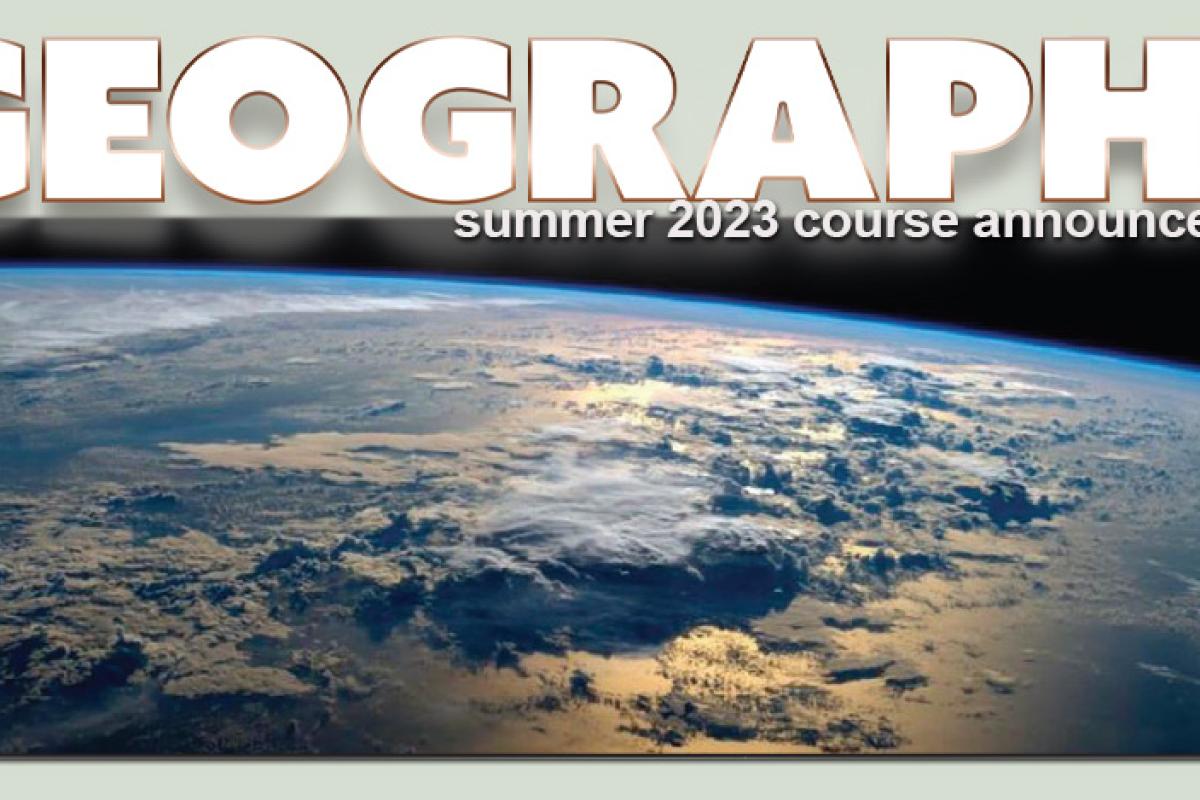
GEOG 4563/5563
Earth Analytics
Elsa Culler, Summer Variable Session, Remote, May 15 - August 24
This multidisciplinary course will address major questions in Earth science and teach students to use the analytical tools necessary to undertake exploration of heterogeneous 'big scientific data.' This course is designed for upper level (junior / senior level)
undergraduate students and graduate students.
Throughout the course you will use computationally intensive techniques to address scientific questions. You will use a suite of different types of publicly available data including:
- Satellite and airborne lidar and spectral remote sensing data.
- Data collected using distributed in situ (on the ground) sensor networks.
- Social media data.
This course is technical. You will use the Python scientific programming environment and the Jupyter Notebook interface to work with data. You will code every week!
This course is developed by Earth Lab. Earth Lab harmonizes the wave of Earth observations from aerospace platforms to address scientific challenges in understanding the pace and pattern of global change.
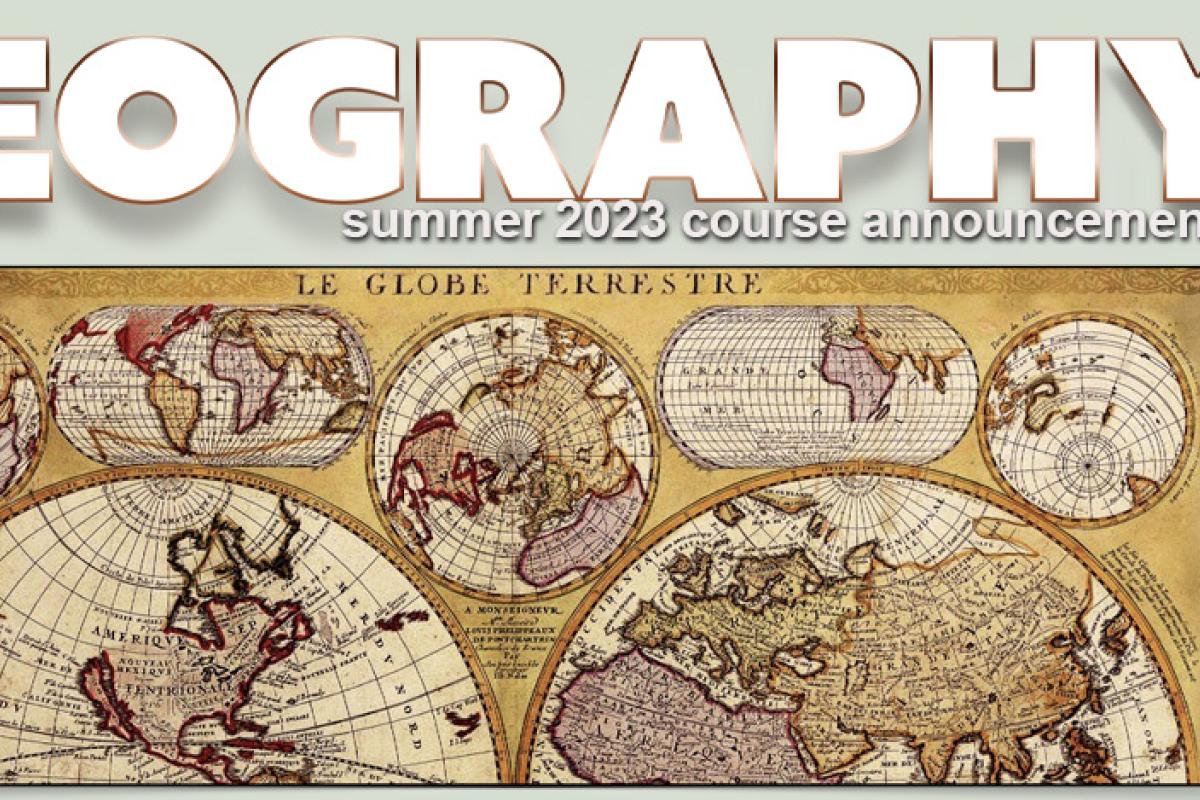
GEOG 4603/5601
Earth Analytics
Section 001: Stefan Leyk, Maymester, Remote, May 15 - June 2
This course is designed as an introductory class to Geographic Information Systems (GIS) suitable for students (graduate and undergraduate) from Geography, Environmental Sciences, Engineering, Geology, Ecology/Biology, Anthropology, Economy, Education or Sociology who are interested in learning about GIS tools and their underlying principles and how to apply GIS to analytical and mapping-related tasks.
Students will get basic skills for working in a GIS environment without formal prerequisites in Cartography or Statistics. I will introduce basic theoretical and practical elements of GIS and GIScience that are important to get started on a GIS project, handling and managing geospatial data, creating maps and conducting GIS analysis. Students will work in ArcGIS and QGIS software on tasks typically encountered in the social and natural sciences.
We will meet in the KESDA computer lab in the Geography building. The format of class meetings will alternate between lecture/demo/in-class exercise components and computer exercises. This way concepts discussed in lecture will be directly put in practice to better understand underlying mechanics, results, problems and important implications resulting from decisions made based on such results.

